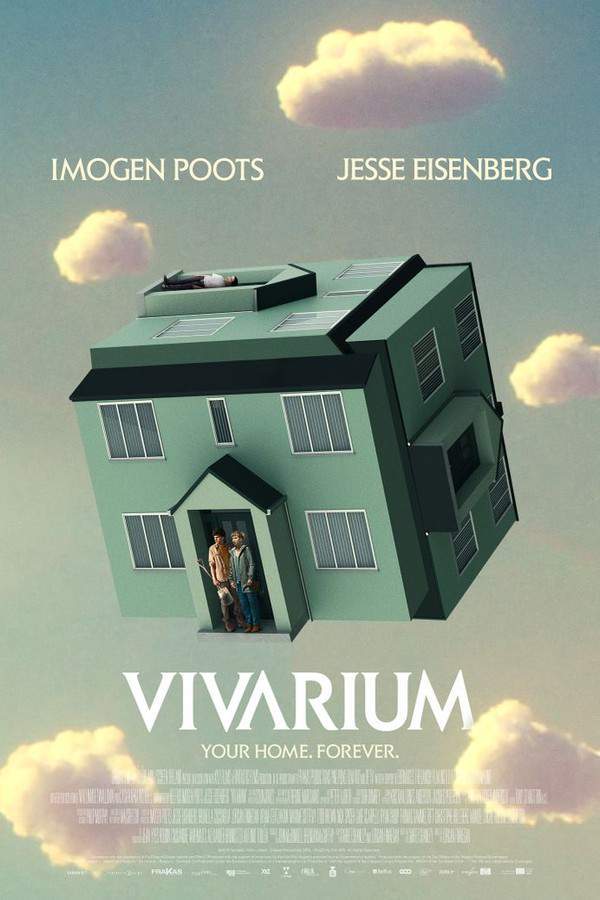
Vivarium
Tom and Gemma are searching for a home and are led to a peculiar, eerily perfect suburban development called Yonder. As they explore, they find themselves unable to leave, trapped in a seemingly endless loop of identical houses and streets. The unsettling environment and the pressure to settle down forces them to confront unsettling questions about their lives and the nature of their confinement, leading them into a surreal and increasingly terrifying situation.
Warning: spoilers below!
Haven’t seen Vivarium yet? This summary contains major spoilers. Bookmark the page, watch the movie, and come back for the full breakdown. If you're ready, scroll on and relive the story!
Vivarium (2020) – Ending Explained & Final Scene Breakdown
Still thinking about how Vivarium (2020) ended? Here’s a full breakdown of the ending, key final moments, major twists, and the deeper meaning behind the film’s conclusion.
The ending of Vivarium reveals that the suburban nightmare the couple finds themselves in—the endless, identical Yonder—is actually an elaborate trap created by alien or extradimensional beings who prey on human couples. Tom and Gemma, who were initially trying to buy a home, are caught in this recursive, simulated world where they are forced to care for a strange, rapidly aging child—the Boy—who is actually an alien offspring. As the story progresses, the couple’s attempts to escape are thwarted, and they become increasingly worn down by their helpless situation. The Boy, who grows into an adult in mere days, demonstrates no genuine emotional attachment; instead, he mimics and manipulates them, revealing himself as a parasitic entity. Eventually, Tom dies after digging a hole out of frustration, and Gemma, after a final struggle, is killed by the Boy, who is revealed to be a product of this horrific cycle—raised and reused to continue the invasion.
In the climax, Gemma escapes into an underground labyrinth filled with endless parallel worlds, confirming that Yonder is a multiversal hive of identical, miserable realities designed to breed and sustain this parasitic species. She discovers that the aliens operate much like brood parasites—laying eggs that are raised by unwitting humans—only to discard them once they are of no further use. This is symbolized by the Boy’s violent transformation into adult and monstrous forms, as well as the strange patterns and symbols seen throughout the film, hinting at a larger alien invasion.
At the very end, the cycle resets. The alien-like Martin, who is revealed to be another successful product of this cycle, dies and hands over his identity to the Boy, who then takes his place as the next “Martin,” ready to trap another young couple and begin the process anew. The real horror is that these invaders are not emotional or compassionate—they see humans only as breeding hosts—and the entire Yonder world functions as an endless, cruel experiment. The film’s bleak conclusion underscores societal fears about conformity, the illusion of choice, and the terrifying prospect of being trapped in systems like consumer capitalism and social expectations that strip away autonomy, leaving individuals as mere cogs in a despairing, repetitive cycle. Ultimately, Vivarium presents a nightmarish allegory about the human condition, choice, and the alien forces lurking behind everyday life.
Last Updated: June 25, 2025 at 08:59
Unlock the Full Story of Vivarium
Don't stop at just watching — explore Vivarium in full detail. From the complete plot summary and scene-by-scene timeline to character breakdowns, thematic analysis, and a deep dive into the ending — every page helps you truly understand what Vivarium is all about. Plus, discover what's next after the movie.
Vivarium Summary
Read a complete plot summary of Vivarium, including all key story points, character arcs, and turning points. This in-depth recap is ideal for understanding the narrative structure or reviewing what happened in the movie.

Vivarium Timeline
Track the full timeline of Vivarium with every major event arranged chronologically. Perfect for decoding non-linear storytelling, flashbacks, or parallel narratives with a clear scene-by-scene breakdown.


